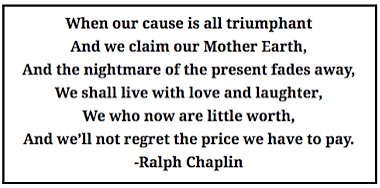 —————
—————
Hellraisers Journal – Tuesday May 23, 1922
Review: Bars and Shadows the Prison Poems of Ralph Chaplin
From the Oklahoma Leader of May 22, 1922:
 —————
—————
Hellraisers Journal – Tuesday May 23, 1922
Review: Bars and Shadows the Prison Poems of Ralph Chaplin
From the Oklahoma Leader of May 22, 1922:
 —————
—————
Hellraisers Journal – Saturday May 13, 1922
Mary Heaton Vorse on Children’s Crusade for Amnesty
From The Nation of May 10, 1922:
The Children’s Crusade for Amnesty
By MARY HEATON VORSE
A GROUP of travel-worn working women and their children paraded from the Grand Central Station up Madison Avenue. The young girls stared straight ahead of them; babies stumbled with fatigue. Women, carrying children, sagged along wearily. They carry banners. The little boy who walks on ahead has a firm mouth and holds his head up. His banner reads “A Little Child Shall Lead Them.” There are other banners, which read “A Hundred and Thirteen Men Jailed for Their Opinions”; “Eugene Debs Is Free-Why Not My Daddy?” One banner inquires “Is the Constitution Dead?” One young girl carries a banner, “My Mother Died of Grief.” One woman with a three-year-old baby holds a banner saying “I Never Saw My Daddy.”
Reporters, movie men, and members of the bomb squad accompany the band of women and children. This is a new sort of show. This is a grief parade. These are the wives and children of men serving sentences under the Espionage Act, the wives and children of political prisoners jailed for their opinions. Some of the men did not believe in killing, and some belong to labor organizations. Not one of them was accused of any crime. They are serving sentences from five to twenty years.
Their wives and children are on a crusade. They have come from Kansas corn-fields and from the cotton farms of Oklahoma, from New England mill towns, from small places in the Southwest. They have been through many cities. They are on the way to Washington to see the President of the United States.* They have come here showing their wounds and their humiliation. They have spread out before us their frugal, laborious days. With a terrible bravery they have displayed them so that you and I might see them and be moved—perhaps, and, perhaps, help.
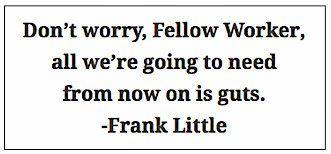 ————————
————————
Hellraisers Journal – Saturday December 3, 1921
Prison Poem by Ralph Chaplin: “To My Little Son”
& Etching by Roderick Seidenberg: “Ft. Leavenworth”
From The Liberator of December 1921:
——-
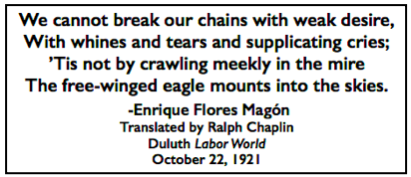 —————
—————
Hellraisers Journal – Sunday October 23, 1921
“To The Struggle” -a Poem by Enrique Flores Magón
From the Duluth Labor World of October 22, 1921:
 —————
—————
Hellraisers Journal – Saturday September 10, 1921
“To My Little Son” by Ralph Chaplin, Chicago I. W. W. Class War Prisoner
From the Leavenworth New Era of September 9, 1921:
 —————
—————
Hellraisers Journal – Saturday August 20, 1921
Photograph of Chicago I. W. W. Class War Prisoner before Return to Prison
From The Messenger of August 1921:
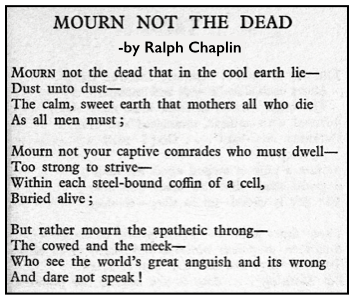 ———-
———-
Hellraisers Journal – Wednesday April 27, 1921
Leavenworth, Kansas – Fellow Workers Report to Prison Voluntarily
From The Leavenworth Times of April 26, 1921:
PRISON WELCOMES TWENTY
WOBBLIES TO ITS ROCK PILE.
———-INDUSTRIAL WORKERS OF WORLD
REPORTED VOLUNTARILY YESTERDAY.
———-SAY ‘HAYWOOD IS COMING’
———-Charles Ashleigh, Oxford Graduate, Ralph H. Chaplin, Artist-Poet,
Ben Fletcher, Walking Delegate and Other “Leading Lights”
Among Those Who Re-Entered Federal Penitentiary
-Several Refuse to Believe “Big Bill” Fled to Escape Sentence.
———-
Twenty of the forty-six Industrial Workers of the World, convicted for violation of the espionage law and obliged to return to the Federal penitentiary because the United States supreme court denied an appeal on a trial review, reported voluntarily yesterday.
“Haywood will be here soon,” declared most of the “wobblies,” who reported yesterday. They refuse to believe that “Big Bill,” their international secretary and chieftain, fled to Russia to escape the prison sentence of five to twenty years.
Stanley J. Clark, Chicago attorney, under sentence of ten years, was the first to report. He arrived yesterday morning from Fort Worth, Tex. Charles Bennett, also under sentence of ten years, was the twentieth man to report, being “dressed in” at 5 o’clock yesterday evening.
Twelve “wobblies” marched through the prison gates in one group. Among the twelve were Ben Fletcher, walking delegate for the I. W, W. and the only colored man in the entire consignment Charles Ashleigh, Englishman and graduate of Oxford University, and Ralph H. Chaplin, artist and poet, who was detailed by the “wobblies” to investigate the Centralia, Wash., conspiracy. Nizra Pietro [Pietro Nigra], who drew the shortest sentence, only ten months, also reported.
 ———-
———-
Hellraisers Journal – Sunday January 2, 1921
Chicago, Illinois – Mary Heaton Vorse Has Supper with Convicted Fellow Workers
From The Liberator of January 1921:
Twenty Years
By Mary Heaton Vorse
RECENTLY in Chicago, after a meeting, I went to get a sandwich with a group of labor men. As I looked around the table, it came to me with a shock that I was the only person there, but one, who was not condemned to a long jail sentence. For all the people at the table were members of the Industrial Workers of the World convicted in the famous Chicago case.
Ralph Chaplin sat next to me. I had been talking only a few minutes before with his wife, a girl of extraordinary loveliness. She had not come out with us to supper because she had gone home to put her little boy of seven to bed. I had seen them standing all three together, only a half hour before.
Ralph Chaplin is a gifted idealist, a poet, as well as a man of action. His quality of uncompromising courage made me think of Jack Reed. It is upon such youth that the strength of a people is founded, men ready to suffer and with gifts to make people understand the beliefs which have stirred their hearts. And his wife is like him. It made you feel right with life to see them together. They face a 20-year sentence.
Ralph Chaplin is to be put in jail because he belonged to an industrial union, a legal organization.
Ralph Chaplin was Editor of “Solidarity.” And that is why he was given twenty years. It was a pretty bad crime for anyone to hold a red card. The talented ones were selected for 20-year sentences. Apparently Judge Landis could not bear that a man of attainments and gifts should belong to the organization of the I. W. W.
Charles Ashleigh is another poet. What had he done? He had been an I. W. W. He has a sentence of five years. He was one of those against whose sentence even Captain Lanier of the Military Intelligence protested. One wonders if the Captain had ever read the poem by his distinguished relative, called “Jacquerie.” And so Charles Ashleigh is among those who are slated for Leavenworth, where he has already spent two years.
Opposite me sat George Hardy, the. General Executive Secretary. He was one of those who got off easy. He only got a year and he has already served his sentence. No one knew exactly why some got long sentences or why some got short ones.
Bill Haywood, at the head of the table, as a matter of course was given the maximum sentence; that means a death sentence if it is carried out.
 ———-
———-
Hellraisers Journal – Wednesday November 3, 1920
Industrial Workers of the World – Some November Anniversaries
From The One Big Union Monthly of November 1920:
Some I. W. W. Anniversaries
The month of November is particularly rich in memories for the I. W. W.
The events of the day are crowding upon us so fast that we cannot devote much time or space in our publications to the memories of the past, but not for a moment should the workers of this country be allowed to forget the outrages committed upon us in years gone by.
For the time being we shall content ourselves with a very brief review of some of the most horrid anniversaries of the I. W. W., which should be “celebrated” this month, not forgetting such anniversaries as that of Frank Little, whose anniversary falls in a different month.
On November 19, 1915, Joe Hill was legally murdered in the prison of Salt Lake City, Utah. His ashes are scattered by loving friends, who believe in his innocence, over the flower beds of this and other countries, and his memory lives in the songs which the I. W. W. members sing on every occasion.
Besides being a writer of songs which made the workers of all countries listen, Joe Hill, the miner, was also an amateur cartoonist. We reproduce here with a couple of his cartoons.
On November 5th, 1916, The Everett Massacre took place. We shall not try to describe this terrible tragedy of the class struggle. We refer every body to the account of it, issued in a book of 302 pages by the I. W. W. This book, “The I. W. W. Massacre,” is written by Walker C. Smith and sold by the I. W. W. Should be read by every red- blooded worker. Five were killed and scores wounded.
The Everett Massacre was one of the foulest deeds ever committed by the dirty hirelings of the capitalist class. It can be compared only to the indescribable horrors of Armistice day in Centralia, Wash., on November 11, 1919. The gruesome death of our Fellow Worker Wesley Everest on that day is enough to stagger the world. We cannot go into details. Read the book “The Centralia Conspiracy,” by Ralph Chaplin. It describes in word and illustration those terrible days.
Fellow Worker Bert Bland, who with a number of others is now serving a sentence equal to life imprisonment in Montesano as a result of the Centralia conspiracy, writes a touching tribute to the memory of the martyr Wesley Everest, which is published herewith.
Wesley Everest’s last greeting was: “Tell all the boys I did my best.” Joe Hill’s last message was: “Don’t mourn. Organize!” Frank Little’s last message is known only to his murderers, but we have no doubt it was like Joe Hill’s.
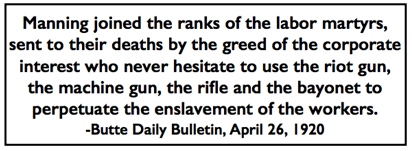 ———-
———-
Hellraisers Journal – Thursday June 10, 1920
Butte, Montana – Metal Miners’ Honor Picket Line of Blood
From The One Big Union Monthly of June 1920:
“The Richest hill in the world” has once more been stained with the blood of workers. Its arrogant industrial autocrats of Butte have again taken refuge in murder to shield themselves from the organized power of the union miners. The lynching of Frank Little has been paralleled by the massacre on Anaconda road. Butte-naked, barren, black—the city of gun-men and widows, of “sweat-holes” and cemeteries, stands out before the world today a blot on what we call civilization. Machine guns and searchlights command the city from the heights. Armed soldiers guard the approaches to the mines and gun-men loiter at every corner, or whiz up and down the streets at all hours of the day and night. There is one place on Anaconda road where everything in sight has been riddled with bullets. The blood of the dead and wounded has hardly dried in the dust. Miners have been told in unmistakable language that their constitutional right to picket means nothing and that the will of the copper trust is mightier than the law of the land. Bloody Butte! It is an ignoble title—ignobly won. But it is a fitting title.
The overlords of Butte will not permit their right to exploit to be challenged. Drunk with unbridled power and the countless millions profiteered during the war, with lying phrases of “law and order” on their lips, the blood of workingmen dripping from their hands and the gold of the government bursting their coffers they face the nation unreprimanded and unashamed—reaction militant, capitalism at its worst. The copper trust can murder its slaves in broad daylight on any occasion and under any pretext. There is no law to call a halt. In the confines of this greed ruled city the gun-man has replaced the Constitution. Butte is a law unto herself.
This huge mining camp is typical of the present stage of capitalism. The parasites of big business, furious with the realization of their approaching doom, are striking at the working class more blindly,more ferociously and more frequently than ever before. Even their most savage anti-labor laws are proving themselves inadequate to darken the rising sun of solidarity.
The gunman and lynch-mob are more and more replacing the law as measures of labor repression. The old maxim “whom the gods would destroy they first make mad” is finding daily confirmation.
Holy grove, Ludlow, Calumet, Everett and Bisbee still stand as grewsome monuments to the White Terror in America. Butte has been added to the list for a second time. Armistice Day in Centralia is only a few month past yet we can no longer refer to it as “yesterday” but the day before. Yesterday was the massacre on Anaconda road. Nobody knows where the blow will fall tomorrow. Things are moving rapidly these days.